大学英语部分常考知识点
- 格式:doc
- 大小:121.15 KB
- 文档页数:13
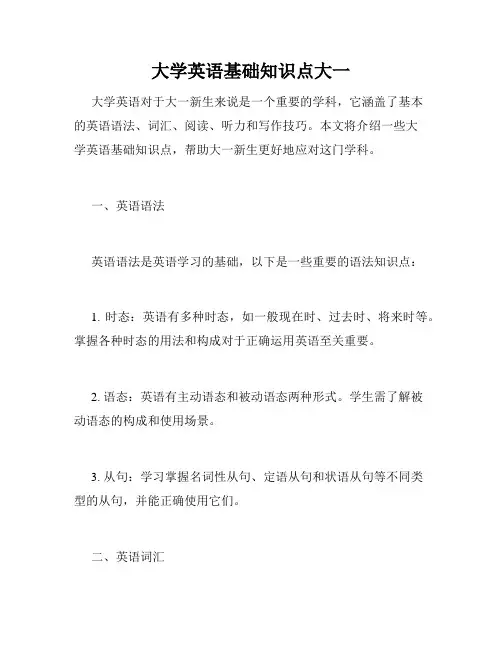
大学英语基础知识点大一大学英语对于大一新生来说是一个重要的学科,它涵盖了基本的英语语法、词汇、阅读、听力和写作技巧。
本文将介绍一些大学英语基础知识点,帮助大一新生更好地应对这门学科。
一、英语语法英语语法是英语学习的基础,以下是一些重要的语法知识点:1. 时态:英语有多种时态,如一般现在时、过去时、将来时等。
掌握各种时态的用法和构成对于正确运用英语至关重要。
2. 语态:英语有主动语态和被动语态两种形式。
学生需了解被动语态的构成和使用场景。
3. 从句:学习掌握名词性从句、定语从句和状语从句等不同类型的从句,并能正确使用它们。
二、英语词汇扩大词汇量是提高英语水平的关键。
以下是一些建议:1. 单词记忆:利用词卡、手机应用等工具,记忆常用单词的拼写、发音和意义。
2. 词根词缀:学习一些常用的词根和词缀,可以帮助理解和记忆更多的单词。
3. 同义词和反义词:了解词汇的近义词和反义词,可以帮助丰富表达方式。
三、英语阅读阅读是提高英语综合能力的重要途径。
以下是一些提高英语阅读能力的方法:1. 阅读量:多读英语文章,包括新闻、故事、杂志等。
逐渐提高阅读难度,培养阅读理解能力。
2. 阅读技巧:学习使用略读、扫读、精读等不同的阅读技巧,提高阅读速度和理解力。
3. 生词学习:遇到不认识的生词时,学会通过上下文猜测词义,不必查字典。
四、英语听力听力是英语学习中的一项重要技能,以下是一些建议:1. 多听英语材料:如英语音乐、电影、电视剧和英语教材中的录音等。
通过多听,提高对英语语音、语调和表达方式的理解。
2. 留意听力材料的难度:初学阶段,选择适合自己的听力材料,逐渐增加难度。
3. 笔记记录:听英语材料时,可以同时记录重要的信息,以便后续复习和理解。
五、英语写作写作是对英语学习成果的输出,以下是一些写作技巧:1. 句型和连词的使用:学习一些常用的句型和连接词,使文章结构更加清晰和紧凑。
2. 逻辑思维:构思文章时,要注意逻辑关系和段落间的过渡,使文章条理清晰。
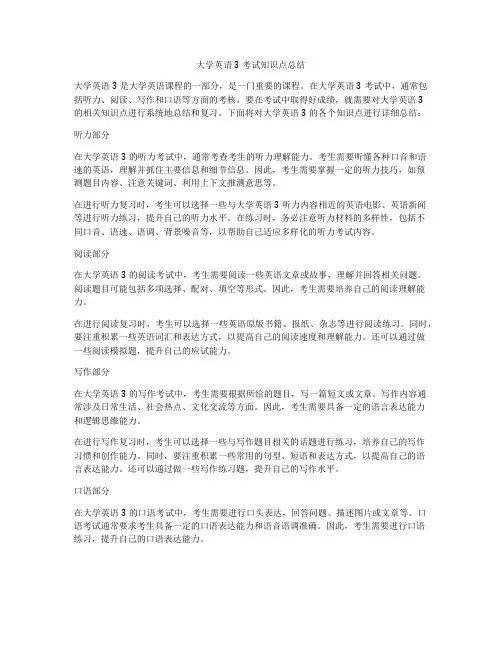
大学英语3考试知识点总结大学英语3是大学英语课程的一部分,是一门重要的课程。
在大学英语3考试中,通常包括听力、阅读、写作和口语等方面的考核。
要在考试中取得好成绩,就需要对大学英语3的相关知识点进行系统地总结和复习。
下面将对大学英语3的各个知识点进行详细总结:听力部分在大学英语3的听力考试中,通常考查考生的听力理解能力。
考生需要听懂各种口音和语速的英语,理解并抓住主要信息和细节信息。
因此,考生需要掌握一定的听力技巧,如预测题目内容、注意关键词、利用上下文推测意思等。
在进行听力复习时,考生可以选择一些与大学英语3听力内容相近的英语电影、英语新闻等进行听力练习,提升自己的听力水平。
在练习时,务必注意听力材料的多样性,包括不同口音、语速、语调、背景噪音等,以帮助自己适应多样化的听力考试内容。
阅读部分在大学英语3的阅读考试中,考生需要阅读一些英语文章或故事,理解并回答相关问题。
阅读题目可能包括多项选择、配对、填空等形式。
因此,考生需要培养自己的阅读理解能力。
在进行阅读复习时,考生可以选择一些英语原版书籍、报纸、杂志等进行阅读练习。
同时,要注重积累一些英语词汇和表达方式,以提高自己的阅读速度和理解能力。
还可以通过做一些阅读模拟题,提升自己的应试能力。
写作部分在大学英语3的写作考试中,考生需要根据所给的题目,写一篇短文或文章。
写作内容通常涉及日常生活、社会热点、文化交流等方面。
因此,考生需要具备一定的语言表达能力和逻辑思维能力。
在进行写作复习时,考生可以选择一些与写作题目相关的话题进行练习,培养自己的写作习惯和创作能力。
同时,要注重积累一些常用的句型、短语和表达方式,以提高自己的语言表达能力。
还可以通过做一些写作练习题,提升自己的写作水平。
口语部分在大学英语3的口语考试中,考生需要进行口头表达,回答问题、描述图片或文章等。
口语考试通常要求考生具备一定的口语表达能力和语音语调准确。
因此,考生需要进行口语练习,提升自己的口语表达能力。
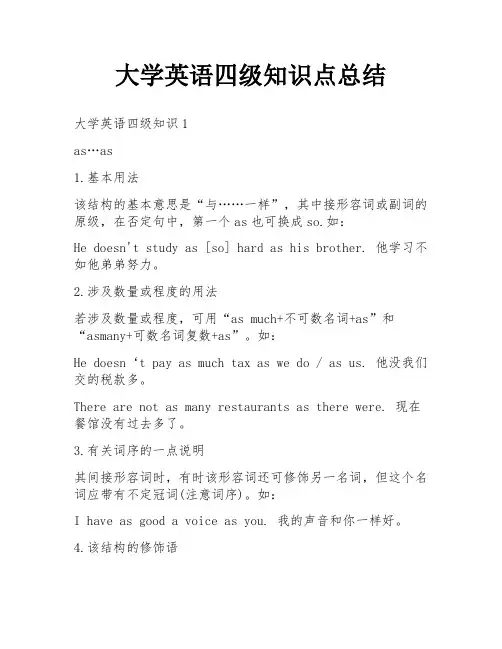
大学英语四级知识点总结大学英语四级知识1as…as1.基本用法该结构的基本意思是“与……一样”,其中接形容词或副词的原级,在否定句中,第一个as也可换成so.如:He doesn't study as [so] hard as his brother. 他学习不如他弟弟努力。
2.涉及数量或程度的用法若涉及数量或程度,可用“as much+不可数名词+as”和“asmany+可数名词复数+as”。
如:He doesn‘t pay as much tax as we do / as us. 他没我们交的税款多。
There are not as many restaurants as there were. 现在餐馆没有过去多了。
3.有关词序的一点说明其间接形容词时,有时该形容词还可修饰另一名词,但这个名词应带有不定冠词(注意词序)。
如:I have as good a voice as you. 我的声音和你一样好。
4.该结构的修饰语根据情况可用(not) nearly, almost, just, nothing like, exactly, not quite, half, one-ten, twice, threetimes, 30 per cent等修饰,并且这些修饰语必须置于第一个as之前,而不能置于其后。
如:This room is twice as large as that one. 这个房间是那个房间的两个大。
You‘re not half as clever us you think you are. 你远不是自己想像的那么聪明。
It took three times as long as I had expected. 这件事比我预料的多花了两倍的时间。
大学英语四级知识2first & at first1、从词性上看区别first可用作形容词或副词,有时还可用作代词;而at first 作为介词短语,只起副词用作用(在句中用作状语)。
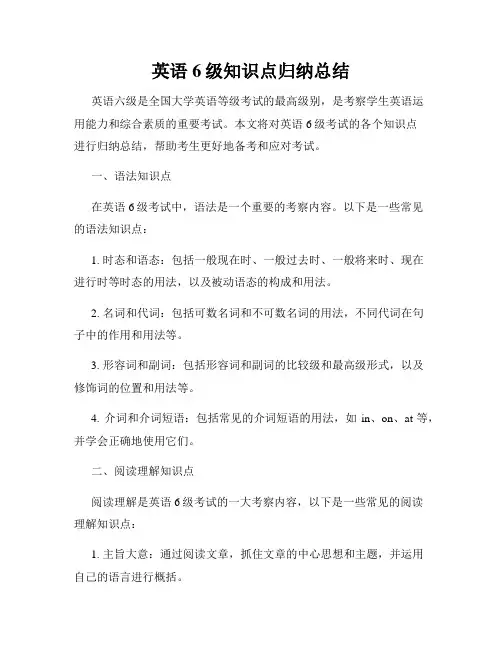
英语6级知识点归纳总结英语六级是全国大学英语等级考试的最高级别,是考察学生英语运用能力和综合素质的重要考试。
本文将对英语6级考试的各个知识点进行归纳总结,帮助考生更好地备考和应对考试。
一、语法知识点在英语6级考试中,语法是一个重要的考察内容。
以下是一些常见的语法知识点:1. 时态和语态:包括一般现在时、一般过去时、一般将来时、现在进行时等时态的用法,以及被动语态的构成和用法。
2. 名词和代词:包括可数名词和不可数名词的用法,不同代词在句子中的作用和用法等。
3. 形容词和副词:包括形容词和副词的比较级和最高级形式,以及修饰词的位置和用法等。
4. 介词和介词短语:包括常见的介词短语的用法,如in、on、at等,并学会正确地使用它们。
二、阅读理解知识点阅读理解是英语6级考试的一大考察内容,以下是一些常见的阅读理解知识点:1. 主旨大意:通过阅读文章,抓住文章的中心思想和主题,并运用自己的语言进行概括。
2. 细节理解:掌握阅读技巧,快速定位并理解文章中的关键细节信息。
3. 推理判断:根据文章提供的信息进行推理判断,理解作者的观点和态度。
4. 词汇理解:通过上下文推测词义,掌握词汇的多义性和派生词的用法。
三、写作技巧知识点写作是英语6级考试的重要组成部分,以下是一些常见的写作技巧知识点:1. 英语写作结构:合理组织文章结构,包括引言、主体段落和结论等。
2. 逻辑连接词:使用逻辑连接词来连接不同的句子和段落,使文章表达更加连贯。
3. 合理使用时态和语态:根据写作要求,准确使用不同的时态和语态表达观点。
4. 注意语法和拼写错误:写作时要注意语法和拼写的准确性,避免出现错误。
四、听力技巧知识点听力是英语6级考试中的重点部分,以下是一些常见的听力技巧知识点:1. 预测信息:在听力开始之前,先浏览问题,预测可能出现的答案,有针对性地进行听力理解。
2. 关键词定位:注意抓住听力材料中的关键词,帮助理解和准确定位。
3. 注意听力材料的转折和逻辑关系:在听力过程中,注意抓住材料中的转折词和逻辑关系,帮助理解内容。
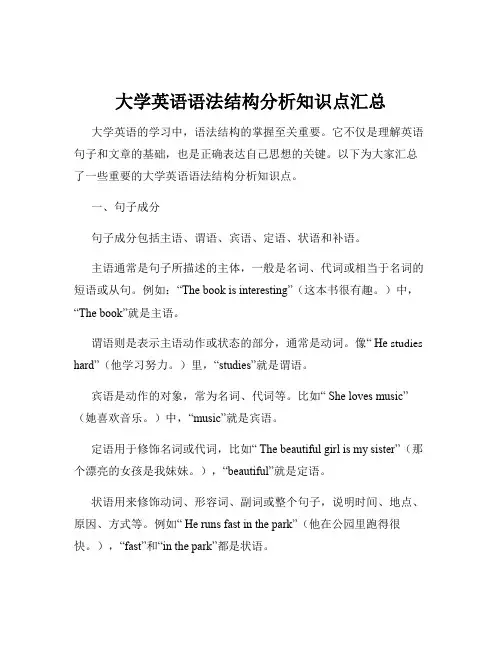
大学英语语法结构分析知识点汇总大学英语的学习中,语法结构的掌握至关重要。
它不仅是理解英语句子和文章的基础,也是正确表达自己思想的关键。
以下为大家汇总了一些重要的大学英语语法结构分析知识点。
一、句子成分句子成分包括主语、谓语、宾语、定语、状语和补语。
主语通常是句子所描述的主体,一般是名词、代词或相当于名词的短语或从句。
例如:“The book is interesting”(这本书很有趣。
)中,“The book”就是主语。
谓语则是表示主语动作或状态的部分,通常是动词。
像“ He studies hard”(他学习努力。
)里,“studies”就是谓语。
宾语是动作的对象,常为名词、代词等。
比如“ She loves music”(她喜欢音乐。
)中,“music”就是宾语。
定语用于修饰名词或代词,比如“ The beautiful girl is my sister”(那个漂亮的女孩是我妹妹。
),“beautiful”就是定语。
状语用来修饰动词、形容词、副词或整个句子,说明时间、地点、原因、方式等。
例如“ He runs fast in the park”(他在公园里跑得很快。
),“fast”和“in the park”都是状语。
补语则是对主语或宾语进行补充说明,比如“ The flower smells sweet”(这花闻起来很香。
),“sweet”就是补语。
二、名词性从句名词性从句包括主语从句、宾语从句、表语从句和同位语从句。
主语从句在句子中充当主语,例如:“What he said is true”(他说的是真的。
)宾语从句在句中作宾语,像“ I don't know where he lives”(我不知道他住哪儿。
)表语从句在系动词之后,充当表语,比如“ T he problem is whetherwe can finish it on time”(问题是我们能否按时完成。
)同位语从句用于解释说明前面的名词,例如“ The news that he won the game is exciting”(他赢得比赛的消息令人兴奋。
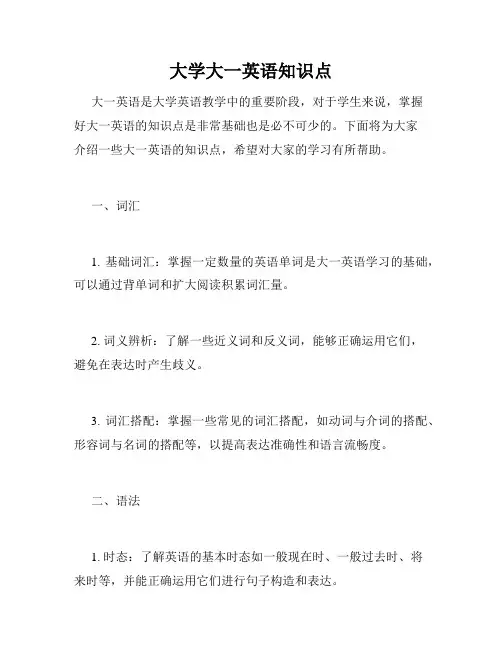
大学大一英语知识点大一英语是大学英语教学中的重要阶段,对于学生来说,掌握好大一英语的知识点是非常基础也是必不可少的。
下面将为大家介绍一些大一英语的知识点,希望对大家的学习有所帮助。
一、词汇1. 基础词汇:掌握一定数量的英语单词是大一英语学习的基础,可以通过背单词和扩大阅读积累词汇量。
2. 词义辨析:了解一些近义词和反义词,能够正确运用它们,避免在表达时产生歧义。
3. 词汇搭配:掌握一些常见的词汇搭配,如动词与介词的搭配、形容词与名词的搭配等,以提高表达准确性和语言流畅度。
二、语法1. 时态:了解英语的基本时态如一般现在时、一般过去时、将来时等,并能正确运用它们进行句子构造和表达。
2. 语态:理解被动语态和主动语态的区别,能够正确运用被动语态进行句子转换和表达。
3. 从句:了解主从复合句的概念,并能正确使用连接词如“that”、“if”、“when”等引导从句。
4. 名词性从句:了解名词性从句的概念和用法,如主语从句、宾语从句、表语从句等。
5. 倒装句:了解倒装句的用法和形式,能够正确运用倒装句进行表达。
三、阅读理解1. 阅读技巧:培养良好的阅读习惯,如快速浏览文章、提前预测答案等,以提高阅读效率和准确性。
2. 理解文章:能够通过阅读理解文章的主旨、段落大意和细节信息,掌握文章的整体含义。
3. 词义推测:通过上下文的提示,准确推测生词和短语的词义,提高阅读理解的准确性和速度。
四、写作技巧1. 句子结构:掌握正确的句子结构,如主谓宾结构、并列句、复合句等,以提高写作的连贯性和准确性。
2. 篇章结构:理解文章的篇章结构,如开头、中间段落和结尾的组织,能够合理组织文章内容。
3. 连词使用:正确使用连词如“and”、“but”、“so”等,使句子之间的逻辑关系更清晰。
4. 写作表达:能够用合适的词汇和句子结构表达自己的观点和意见,提高写作的流畅性和准确性。
五、口语表达1. 口语技巧:提高口语表达的流畅性和连贯性,如正确运用衔接词、使用固定搭配等。
大一英语综合教程1知识点大一英语综合教程1是大学英语课程中的核心教材之一,通过学习这门课程,学生们可以掌握英语基础知识,提高听说读写能力。
本文将介绍大一英语综合教程1中的重要知识点,包括词汇、语法、听力和阅读等方面。
一、词汇知识点1. 同义词:在学习词汇时,我们需要注意一些常见的同义词。
例如,happy和glad都表示“快乐”的意思,但在使用时有一些细微区别。
('glad' usually suggests a temporary happiness about a particular event, whereas 'happy' suggests a general sense of well-being or contentment.)2. 前缀和后缀:掌握常用的前缀和后缀可以帮助我们更好地识别单词的词义。
例如,dis-表示否定,un-也表示否定,如dislike和unhappy。
二、语法知识点1. 时态:时态是英语语法中的重要概念,包括一般现在时、一般过去时、一般将来时等。
掌握各种时态的用法是进行有效语言交流的关键之一。
2. 从句:从句是一个句子中的一部分,可以作为名词、形容词或副词的一个补充。
了解从句的类型和使用方法有助于提高阅读和写作的能力。
三、听力知识点1. 听力技巧:在进行听力理解时,我们需要掌握一些有效的技巧。
例如,注意关键词、听清说话人的语调和语速以及根据上下文推断出正确答案等。
2. 笔记记法:在听力过程中,我们可以采用不同的记笔记方法来帮助我们更好地理解和记忆所听到的内容。
例如,可以使用简化的符号或图标来记录主要信息。
四、阅读知识点1. 阅读技巧:提高阅读能力的关键在于掌握一些有效的技巧,如快速浏览文章、注意关键词、遇到生词时运用上下文推测词义等。
2. 阅读理解题型:了解不同类型的阅读理解题型及其解题方法对于提高阅读能力和应试能力都是非常重要的。
大学英语四六级考试decide的用法必考知识点总结“decide”是一个常用的动词,在大学英语四六级中有多种重要用法:一、基本用法1. decide to do sth.(决定做某事)- 例句:She decided to study abroad after graduation.(她决定毕业后出国留学。
)- 解析:“decide to do sth.”是最常见的结构,表示做出一个做某事的决定。
在这个句子中,“study abroad”是她决定要进行的动作。
2. decide (that) + 从句(决定……)- 例句:They decided (that) they would hold a party to celebrate their victory.(他们决定举办一个派对来庆祝他们的胜利。
)- 解析:“that”引导的宾语从句用于说明决定的具体内容,在这个句子中,从句“they would hold a party to celebrate their victory”是他们所做出的决定。
二、拓展用法3. decide on/upon sth.(对……作出决定;选定)- 例句:We need to decide on a date for the meeting.(我们需要确定会议的日期。
)- 解析:“decide on/upon”后面接名词或代词,强调在多个选择中确定一个,这里是要在不同的日期选项中选定一个作为会议日期。
4. decide against sth./doing sth.(决定不做某事;作出不利于……的决定)- 例句:After careful consideration, he decided against taking the job.(经过仔细考虑,他决定不接受这份工作。
)- 解析:“decide against”表示做出与某事物相反的决定,在这个句子中就是不选择接受这份工作。
冠词的知识点总结大学一、定冠词定冠词“the”是英语中唯一的定冠词,它具有如下的用法和特点:1. 特指某一事物或人时,用定冠词“the”。
“the”常常用于已知的特定名词前,表示特指某一事物或人,例如:the sun(太阳)、the moon(月亮)等。
2. 在特指某一类事物或人时,用定冠词“the”。
当特指某一类事物或人时,也需要用定冠词“the”,例如:the rich(富人)、the poor(穷人)等。
3. 用于序数词、形容词最高级前,且其后跟名词时用定冠词“the”,例如:the first day(第一天)、the best student(最好的学生)等。
二、不定冠词不定冠词有两种形式:“a”和“an”,它们的用法和特点如下:1. 不定冠词“a”用于辅音开头的单数名词前,例如:a book(一本书)、a cat(一只猫)等。
2. 不定冠词“an”用于元音开头的单数名词前,例如:an apple(一个苹果)、an elephant (一头大象)等。
3. 不定冠词用于泛指某一事物或人时,例如:I am a student(我是一个学生)、She has a car(她有一辆车)等。
三、冠词的用法冠词在句子中有一定的用法和规则,主要包括以下几点:1. 冠词用于单数可数名词前。
不定冠词“a/an”用于泛指单数可数名词,定冠词“the”用于特指单数可数名词。
2. 冠词用于不可数名词前。
不可数名词前通常不加冠词,但在特指或泛指时需要根据具体情况选择。
3. 冠词用于复数名词前。
定冠词“the”用于特指复数名词,不定冠词“a/an”通常不用于复数名词前。
4. 冠词用于形容词前。
有时形容词前需要加冠词,这取决于形容词修饰的是可数名词还是不可数名词,以及其特指或泛指的情况。
四、冠词的常见错误在使用冠词时,有一些常见的错误需要避免,主要包括以下几点:1. 误用“a”和“an”。
不定冠词“a”用于辅音开头的单数名词前,“an”用于元音开头的单数名词前,需要正确区分使用。
大学英语语法必考知识点1. 语态和时态—Do you see those people on the little sandy island?—Yes, they _______ handkerchiefs for the last half hour. I wonder why.A. were wavingB. wavedC. had wavedD. have been waving【正确答案】D【高考考点】考查动词时态。
现在完成进行时:表示一个从过去某一时刻开始的动作,一直延续到说话时还在进行或刚结束,句中常出现用for, since, how long等引导的时间状语。
e.g. His telephone has been ringing for along time.e.g. It has been raining since last Sunday. e.g. How long have you been wearing glasses?【题干句意】“你有没有看见那些在小岛上的人?”“是的,我看见了。
他们在过去的半小时里一直在挥手帕,我不知道为什么。
”【详细解析】这个挥手帕的动作是在半小时前开始的,然后一直在挥,一直挥到了说话的这个时候,所以我们用的是一个现在完成进行时,强调一个动作的持续。
我们再来看一下其他几个时态:A选项是were waving——过去进行时,它指的是:①过去某一时刻正在进行;②过去某一阶段正在进行;B.waved——过去时,过去某时间发生的且已完成的动作,所以我们知道A和B这两个时态都是和过去有关,而和现在是没有一点关系的,所以A和B这两个答案错了。
C. had waved——过去完成时:过去某一时刻或某一动作前完成的动作或状态,那么它所表达的时候是在过去的过去,例如:e.g. By the end of last year, we had built 5 new schools.到去年年底为止,我们已经建造了5所学校。
常考知识点 2)语义方面: 单词的引申意义,多一次,同义词,近义词,反义词等。 3)逻辑关系方面:(参照test three) 列举,原因,结果,让步,对照,补充,时间顺序,目的,条件等(包括连接词和关系代词或关系副词)等。 表示列举的连词:first , second, third...;firstly, secondly, thirdly...; first,next, then...;in the first place, in the second place...; for one thing, for another thing...; to begin with, to conclude...
表示原因的连词:because , since, as ,now that...
表示结果的连词:so, therefore, thus, hence, accordingly, consequently ,as a result 表示让步和转折的连词:however, nevertheless, nonetheless, still ,though, yet ,in spite of, at any rate, in any case, whoever ,whatever 表示对照的连词:on the contrary, in contrast, by contrast, in comparison, by comparison, conversely 表示补充的连词:also, further, furthermore, likewise, similarly, moreover, in addition, what`s More, too, either, neither, not...but..., not only...but also... 表示时间顺序的连词:when, while, as, after, before, since, until, as soon as, once 表示目的的连词:that, so that, in order that, lest,for fear that
表示条件的连词:if, suppose, unless, in case, so(as) long as, so far as, on condition(that), provided(that) 完形填空的说明 1篇幅:200词左右 2类型:理解为主 3侧重:考察以词义、篇章理解、逻辑关系为主;从词汇语义语篇考查 4涉及:短语用法,词组辨析 5难易:考察对文章的理解;在读懂的基础上并不难 一、完形填空概述 完形填空的内容:语法,词组,根据上下文不可缺少的词汇等。 语法主要指:句型,连接词的选择,介词的用法,动词的各种形式,比较级等。 词组主要指:一些固定词组的搭配 根据上下文来理解判断的词汇是非常重要的填空形式。这必须结合上下文,看懂文章,否则就会造成选择上的失误。 此外,背景知识,考生的常识也列在测试之内。 二、命题特点 1、备选答案一实词为主,虚词为辅。 2、完形填空与考核词汇和语法的单句有根本区别 完形主要考学生对实词的掌握理解,不是考语法结构,进行语法选择,因为虚词更多地反映语言问题。往往影响语法结构。 测试考生使用词汇和语法结构的能力 1) 填空词项包括结构词和实义词 2) 结构词(虚词):包括代词、冠词、介词、连词、关系词等。主要是表示语法结构关系 3) 实义词(实词):包括名词、形容词、数词、动词、和副词。既要看其意思用在句中是否得当,也要看他与其他词的搭配关系是否合适。 三、解题步骤及注意事项: 文章首句非常重要,首句往往是该文章的主题句。 在做题时要联系上下文,注意代词在文章里的前后关系。 语法结构不再是这类题的基本内容,但考生需要一定的语法知识来理解文章。 词汇部分是该项报的考察重点。 词组搭配和习惯用语是英语学习的重点和难点之一,也是该部分必考内容。例如:介词+名词(by /with /through /out of practice) 动词+副词、介词(catch on/at/up/out) 词汇干扰(dependence independence respondence correspondence extensive exclusive) 考试的重点:词汇方面的语义辨析和搭配 语法结构方面的固定搭配 语篇衔接 1.词汇方面 实义词-----名词,动词,形容词,副词 名词--------同义词和防反义词辩义 动词------短语,习惯用语,虚拟语气 形容词----形容词做定于表语,形容词最高级和比较级 副词------各类副词:地点副词、时间副词、方式副词、程度副词、连接副词和人疑问副词 1.1近义词辨析 At this moment, the air hostess( ),she looked pale , but was quite (calm) A) Showed B) presented C )exposed D) appeared 1.2形容词辨析 Human brains are the ( ) A) Same B) identical C) similar D) alike 1.3介词的搭配 Students can learn the right answers ( ) heart in class, and yet never combines them with their working models of the world. A) With B) by C) to D)in 1.4形容词与介词的搭配 The man had to (circle) the airport several times in order to become ( ) with the controls of the plane. A) Intimate B) familiar C) understood D) close 2、语法结构方面 1) 虚拟语气; 2) 定语从句(连接词,限定与非限定定语从句的区别,定语从句与其他主从复合句的区别) 3) 状语从句; 4) 非谓语动词(动词不定式,现在分词,过去分词,动名词); 5) 主谓搭配一致(时态,语态,语气,人称,数); 6) 并列句,省略句,倒装句及割裂的复杂句子; 7) 逻辑主语(主要是非谓语动词的逻辑主语),在句法上不是主谓关系,但在语义上为施动者与动作的关系; 8) 词类之间的搭配要求,如名词需要形容词,名词,冠词,非谓语动词,词组及定语从句修饰;动词需要副词词组修饰;及物动词后应加宾语 语法结构练习1 Even those who had (little) or no training in science might not have made their inventions( ) a ground-work had not been laid by scientists years before A) As B) if C) because D) while 语法结构练习2 The behavior and ideals of people change according to circumstances , but they can always go back or go on to something new ( ) is better and higher than anything (in ) the past. A) That B) what C) whichever D) whatever 语法结构练习3 Never ask a child (whether) he likes and dislikes a food and never (discuss) in front of him or allow______ else to do so. A) Everybody B) anybody C) somebody D) nobody 逻辑关系练习1 Arguably the most important conclusion that emerges from the data,______, is not something that we found -----but what we did not. A) Yet B) still C) moreover D) however 同义词、反义词的复现,上义词下以词复现,概括词复现,代词复现等。 逻辑关系练习2 Many teachers believe that responsibilities for learning lie with the students……it is the _____responsibility to find books , magazines ,and articles in the library. A) Student’s B) professor’s C) assistant’s D)librarian’s 答题技巧 1) 首先从语篇角度考虑,因为语篇考察要占70%以上。 2) 再从句意着手,透彻理解句子的意思。 3) 不要轻易推翻第一反应(第一反应往往来自于语感)。 4) 先易后难,标记题目。 5) 掌握语法结构和规律,记住短语搭配。 第二步:逐句通读全文,各个击破,做到通读与猜测并行 第三步:检查核实,通读赏析通读选定答案后的全文。
语法结构辅导 一、概述 1.1词类 实词:有实义,能在句子中独立担当一定的成分。1名词2代词3数词4形容词5动词6副词 虚词:没有实义,不能在句中独立担当一定的成分。7冠词8介词9连词10感叹词
1.2句子的成分 主要成分 主语 谓语 次要成分 宾语 、定语 、状语 、补语(分为主语补足语和宾语补足语) 补语是用来补充主语和宾语的意思的,一般都着重于说明主语或宾语的身份和特征。表语是表述主语的身份或特征飞的,常由名词或形容词担当,置于连系动词之后,也可以叫做主语补足语。
1.3短语 短语或词组是具有一定意义但不构成从句或句子的一组词。短语在句中可以单独作为一种句子成分。名词短语、动词短语、形容词短语、副词短语、介词短语、不定式短语、动名词短语、分词短语
1.4从句 从句是具有主语部分和谓语部分但不构成分句或独立句子的一组词。 分为:名词性从句(主语从句、表语从句、宾语从句、同位语从句)、定语从句、状语从句